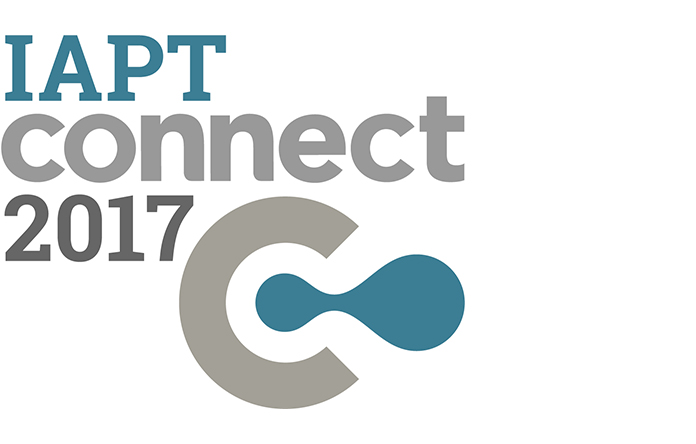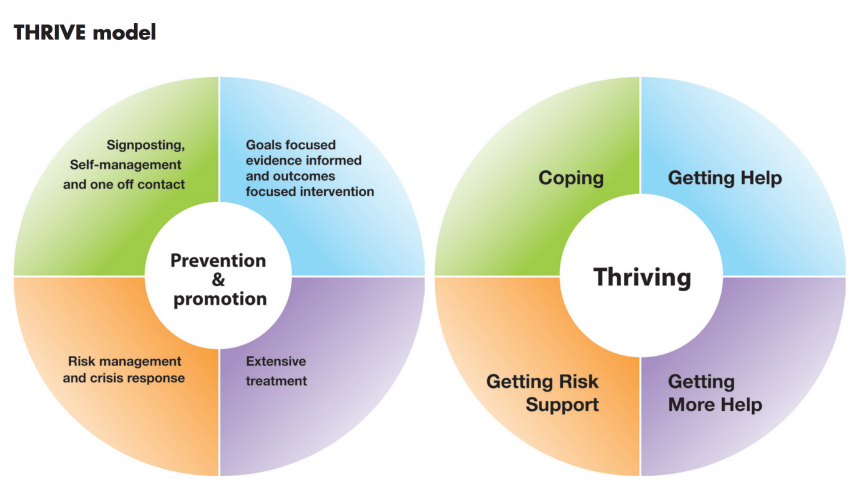
We were delighted to welcome Mark Bunnell, Transformational Lead and Adele Hurst, Next Steps Associate Trainer from Cheshire and Wirral Partnership NHS Foundation Trust to IAPT Connect 2017 to talk about how they are using THRIVE principles and digital tools in their work. You can view Mark and Adele’s slides here.
About THRIVE
The THRIVE framework is an evolution of the traditional tiered model of CAMHS developed by Anna Freud Centre and Tavistock and Portman NHS Trust, designed to enable all services and communities to support young people with mental health needs. Mark described the ‘getting advice’, ‘getting help’, ‘getting more help’ and ‘getting risk support’ stages of the model and talked about how it uses positive language and places emphasis on young people’s engagement and the use of outcome measures.

Source: The AFC-Tavistock Model for CAMHS
Digital resources
Adele introduced us to three digital tools that CWP NHSFT developed in collaboration with children and young people:
- MyMind.org.uk was developed in October 2016 and provides information and resources aimed at 13 to 19 year olds. The Head Strong report documents the making of the MyMind website with young people. The website is supported by Twitter and YouTube accounts and videos include animations following a character called Max’s journey through services as well as a Beautiful Day mindfulness video. The MyMind website has won awards and been recognised nationally.
- Mywell-being.org.uk supports the Healthy Child school nursing service which is integrated with CAMHS in Cheshire and Wirral. The website covers mental and physical health. The Bigger Picture report describes the making of the site with young people. As well as information and resources for children, young people and parents, there’s an online chat function for 11-19 year olds.
- Next Step is a set of Goal Based Outcome resources designed to get children and young people communicating in their own terms about their moods, emotions and helps them to set their own goals. A set of 52 cards, the size of playing cards can be used by parents, teachers, youth workers, social workers or CAMHS practitioners. The online app allows them to record and measure how a young person is progressing with their emotional or mental health issue.
Watch the video introducing Next Step cards:
Adele described how the websites support young people in each part of the THRIVE journey and especially in helping families to access information and resources in the ‘getting advice’ and ‘getting help’ stages, and how Next Step resources can be used at every stage of the journey.
Implementing THRIVE in Cheshire and Wirral
CWP reviewed their system flow for their services and used THRIVE principles to move away from the tiered model in order to remove unnecessary barriers for families and enable more equitable access to services independent of location. Mark described how, in consultation with children and young people, they developed two initiatives:
- A primary mental health work team launched Oct 2016 which offers a phone advice line for professionals to call with any questions about what support is available and if a referral to specialist CAMHS is appropriate. The team also offers training sessions in school settings on topics such as mental health awareness, coping with anxiety and worry, responding to trauma. This fits the ‘getting advice’ quadrant of the THRIVE model.
- A Choice Clinic that aims to provide a single point of access, reducing barriers to entering services and helping to provide more efficient assessments and administration of referrals. The result has been increased satisfaction from referrers and families and better use of signposting, multi-agency liaison and advice giving. The clinic has helped ensure suitable referrals into CAMHS, reducing referrals overall. See the THRIVE case study on the Choice Clinic.
Thanks so much to Mark and Adele for joining us at the event and for such an information packed session.
